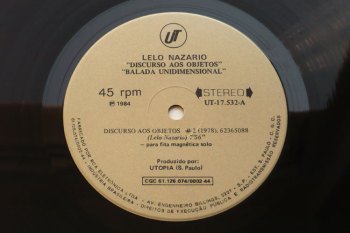B razilian electroacoustic music composer Rodolfo Caesar was born in Rio de Janeiro in 1950. He studied at Uni-Rio in the 70s and at the Instituto Villa-Lobos in Rio. He moved to France in 1973 to study with Pierre Schaeffer at Conservatoire National Supérieur de Musique in Paris and work at the GRM. Back in Brazil in the 1980s, he founded his own studio named Estudio da Gloria, or Glory Studio, in Rio. Caesar composed for dance, video, film and theater, worked as a radio producer and teacher at UFRJ school of music. Caesar belongs to the second generation of Brazilian electroacoustic music composers, after the pioneering works of Reginaldo Carvalho (b1932, founder of the first electroacoustic music studio in Rio in the 1960s named “Estúdio de Música Experimental”), Grupo Música Nova (1963) led by Gilberto Mendes (b1922) in São Paulo, Jocy de Oliveira (b1936) and Jorge Antunes (b1942). See Igor Lintz Maués’ essay “Electroacoustic Music in Brazil”, 1989.
razilian electroacoustic music composer Rodolfo Caesar was born in Rio de Janeiro in 1950. He studied at Uni-Rio in the 70s and at the Instituto Villa-Lobos in Rio. He moved to France in 1973 to study with Pierre Schaeffer at Conservatoire National Supérieur de Musique in Paris and work at the GRM. Back in Brazil in the 1980s, he founded his own studio named Estudio da Gloria, or Glory Studio, in Rio. Caesar composed for dance, video, film and theater, worked as a radio producer and teacher at UFRJ school of music. Caesar belongs to the second generation of Brazilian electroacoustic music composers, after the pioneering works of Reginaldo Carvalho (b1932, founder of the first electroacoustic music studio in Rio in the 1960s named “Estúdio de Música Experimental”), Grupo Música Nova (1963) led by Gilberto Mendes (b1922) in São Paulo, Jocy de Oliveira (b1936) and Jorge Antunes (b1942). See Igor Lintz Maués’ essay “Electroacoustic Music in Brazil”, 1989.
♫ The A Arte Dos Sons LP (or The Art of Sounds) collects 3 uncompromising electroacoustic endeavors composed during Caesar’s stay at GRM in 1973-76. The imposing Curare II (completed 1978), with its radical, brooding electronic transformations of low cello sounds, recalls Iancu Dumitrescu’s 1985-86 Harryphonies (for double bass, percussion, prepared piano and Harryphone), with the same kind of claustrophobic, inescapable atmosphere. Tutti Frutti (1976) adds a musique concrète dimension to the same premises, including bell sounds treatment, synthesizer, metallic noises and percussion (especially in the final part). The refined electronic high frequencies of Les Deux Saisons (1976) act as a welcome pause between the 2 previous compositions. However, as the piece progresses, it accumulates energy and sharpness until it sounds like precision diamond shaping between your ears– which is not that relaxing, after all! Note: Check out the monumental Coletânea de Música Eletroacústica Brasileira 5xCD-set on this blog for an overview of Brazilian electroacoustic music.
01 Curare II (7:34)
02 Les Deux Saisons (6:52)
03 Tutti Frutti (a) (4:03)
04 Tutti Frutti (b) (5:43)
05 Tutti Frutti (c) (8:22)
Total time 32:34
LP, private release, ref. RC 8859, Brazil, 1978
* *
*
















